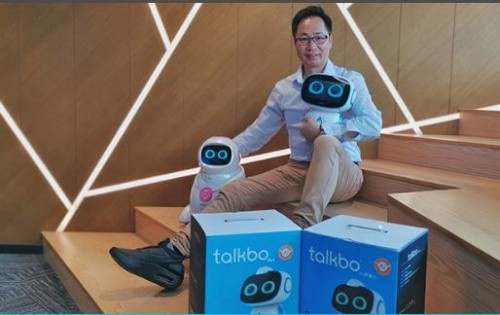Hong Kong-based startup PopSand Robotics has created a chatty robot aimed at helping children learn to English through conversation.
“We know that children who are learning English need someone to practise speaking with them, but often there are no English speakers at home,” said company founder Dr. Jeff Cheng, who established PopSand Robotics in 2018.
“So, our robot combines the increasingly mature voice-interaction technology with artificial intelligence (AI) to help children practise English conversations and letters, and enable them to listen to interesting English stories in the classroom and at home,” he added.
 Called Talkbo, the robot can process incomplete English words and sentences, helping improve children’s English ability since it is able to make sense of English spoken by children learning it as a second language – improving their English grammar and pronunciation.
Called Talkbo, the robot can process incomplete English words and sentences, helping improve children’s English ability since it is able to make sense of English spoken by children learning it as a second language – improving their English grammar and pronunciation.
Talkbo uses Amazon's Alexa voice technology to receive voice input, augmented by a self-developed non-native English speech processing technology that corrects for errors the children are likely to make. Talkbo also uses AI to understand the meaning of sentences and voice commands. If the grammar or pronunciation is wrong, it will correct it.
The robot has a built-in wireless Internet Wi-Fi. When connected to the Internet, users can call “Alexa. It also has buttons and sensing areas letting the machine interact with children while chatting.
Robots as a teaching tool
Cheng said technology can be used to help English-language students circumvent the challenges pose by high tuition fees and a lack of qualified teachers.
"Robots are new, so many people have never had these tools or do not know how to use them. There is a need to seek technical support and teaching, so we first work on a business-to-business basis and then develop B2C [business-to-consumer] business,” he said.
Cheng said the Talkbo robot system takes into account use-cases often found in schools. Once teachers learn to use the robots, the children are taught to learn English with the machines. Parents can then buy the robots to let their children learn English at home, transitioning from B2B to B2C business.
The global push towards online learning, driven by the COVID-19 pandemic, also boosts the business from the point of view of both enterprises and consumers, he noted.
Market expansion
After Hong Kong, PopSand is actively expanding into other markets, including Mainland China and India. Already, Talkbo has been introduced recently in Indonesia.
"Indonesia has a population of more than 270 million people and is a densely populated country. The relatively low penetration of English means there is strong demand English learning and large market,” Cheng said.
Despite the pandemic, PopSand Robotics established contacts with Indonesian political and business leaders with the help of the T-box (Transformation Sandbox) programme of the Hong Kong Trade Development Council’s (HKTDC).
“Attitudes to smart robots differ from the view people take of smartphones. Smart robots still need to be explained, and dedicated personnel need to train users,” said Cheng.
He added: “Since personal experience is important, the T-box team helped line up meetings and exchanges with the Indonesian Consul General in Hong Kong in October last year. T-box also arranged a series of online conferences and teaching sessions, connecting us with Indonesian companies and schools interested in online educational technology. As a result, some of them have bought robots from us. This has greatly helped us in entering the Indonesian market."
PopSand Robotics also learned about the domestic market in the Middle East and Africa through online meeting with HKTDC representatives. And through the council’s help, the company participated in the GITEX electronics exhibition in Dubai in December, where it received inquiries from local companies.
Through online meetings with HKTDC representatives in the Middle East and Africa, PopSand has learnt about local markets and companies, he said. Through the HKTDC’s help, the firm also exhibited at the GITEX electronics exhibition in Dubai in December and received inquiries from local companies.
HKTDC’s T-box programme helps the city’s small and medium-sized enterprises (SMEs) achieve transformation and enhance competitiveness. It is offered free of charge and is open to all companies registered in Hong Kong.
The T-box team works with SMEs to identify their goals and provide support over a three-month period, with group and individualised services including advisory services, workshops, government-funding information, market knowledge and networking opportunities.
Launched in April last year, the programme has over 1,200 SME members to date – for whom more than 300 free consultations have been arranged with professional organisations, chambers of commerce, government agencies and representatives of consulates of various countries.



